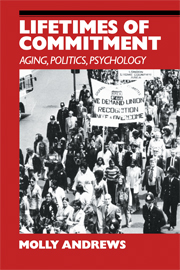Book contents
- Frontmatter
- Contents
- Acknowledgements
- 1 Defying the stereotype
- 2 The potential of social identity theory
- 3 On the subject of subjectivity
- 4 Personal stories
- 5 A nation in turmoil: Britain between the wars
- 6 Radicalization: coming to commitment
- 7 Political conviction and the social self
- 8 Growing into socialism
- Conclusion: aging and sustained purpose
- Notes
- Bibliography
- Index
5 - A nation in turmoil: Britain between the wars
Published online by Cambridge University Press: 23 September 2009
- Frontmatter
- Contents
- Acknowledgements
- 1 Defying the stereotype
- 2 The potential of social identity theory
- 3 On the subject of subjectivity
- 4 Personal stories
- 5 A nation in turmoil: Britain between the wars
- 6 Radicalization: coming to commitment
- 7 Political conviction and the social self
- 8 Growing into socialism
- Conclusion: aging and sustained purpose
- Notes
- Bibliography
- Index
Summary
The road ran downhill into Spain,
The wind blew fresh on bamboo grasses,
The white plane-trees were bone naked
And the issues plain:
Louis MacNeice, ‘Autumn Journal’The inter-war period was for Western Europe, as indeed for much of the world, a time of great ferment: social, political and economic. England was no exception. In this chapter, I shall review some of the major events and movements of this time which might have been of particular significance to the respondents of this study, for this was the time of their young adulthood. It seems obvious that ‘Individuals do not become mobilized out of a political void’ (Marsh 1977: 22): a cursory knowledge of the social and political environment which forms the context of action of an individual or group of individuals is crucial in understanding the evolution of such people's political consciousness and activism.
Our historical review begins just before the end of the First World War, in 1917, the year of the Bolshevik Revolution. Vladimir Ilyich Ulyanov (Lenin), who had been living in exile for nearly two decades, successively in Brussels, Paris, London and Geneva, from where he wrote and distributed revolutionary materials, was able to return permanently to the Soviet Union on 23 October. Promising ‘Peace, Land, Bread’, Lenin successfully lead the seizure of government offices on the 6–8 November, an action which became known as the October Revolution (the month misnomer due to the change in the Russian calendar).
- Type
- Chapter
- Information
- Lifetimes of CommitmentAgeing, Politics, Psychology, pp. 89 - 111Publisher: Cambridge University PressPrint publication year: 1991



